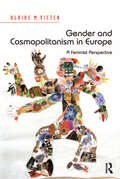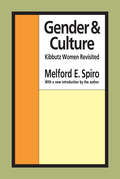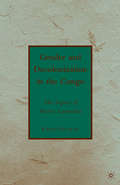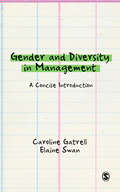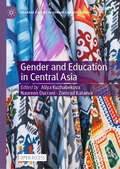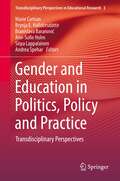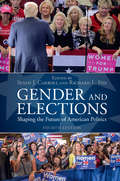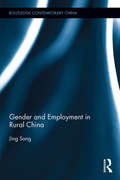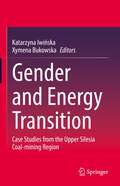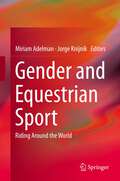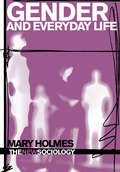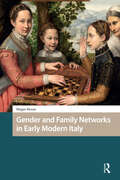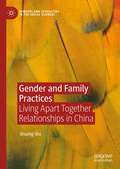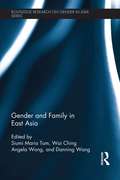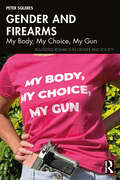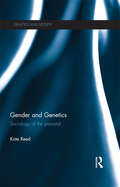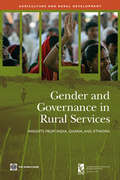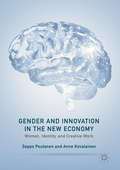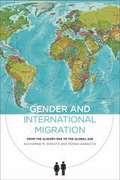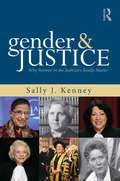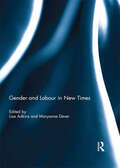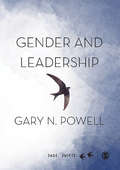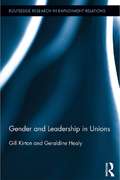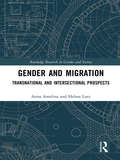- Table View
- List View
Gender and Cosmopolitanism in Europe: A Feminist Perspective
by Ulrike M. VietenGender and Cosmopolitanism in Europe combines a feminist critique of contemporary and prominent approaches to cosmopolitanism with an in-depth analysis of historical cosmopolitanism and the manner in which gendered symbolic boundaries of national political communities in two European countries are drawn. Exploring the work of prominent scholars of new cosmopolitanism in Britain and Germany, including Held, Habermas, Beck and Bhabha, it delivers a timely intervention into current debates on globalisation, Europeanisation and social processes of transformation in and beyond specific national societies. A rigorous examination of the emancipatory potential of current debates surrounding cosmopolitanism in Europe, this book will be of interest to sociologist and political scientists working on questions of identity, inclusion, citizenship, globalisation, cosmopolitanism and gender.
Gender and Culture: Kibbutz Women Revisited
by Melford E. SpiroBased on a study of the Israeli kibbutz movement, Gender and Culture discusses the differences in male and female orientations to marriage, the family, and work. Spiro describes the counterrevolution in the kibbutz movement as it evolved over a quarter century period. The kibbutz Spiro first studied, Kiryat Yedidim, was thirty years old at the time, and he returned there twenty-five years later. Spiro initially found that the pioneers of the kibbutz movement, in their attempt to implement their vision of a society based on sexual equality, had created a revolution in the character of marriage, the structure of the family, patterns of child rearing, and the sexual division of labor.The counterrevolution he found twenty-five years later was no less fascinating: a return to certain important features of the prerevolutionary forms of these social institutions. This return to tradition has been the work primarily of the young women who, born and raised in the kibbutz, had been inculcated with the revolutionary ideology of the kibbutz pioneers. Studying the same community after a twenty-five-year interval enables readers to observe the children of the first study as adults in the follow-up study. This longitudinal dimension provides the most important basis for the interpretations offered in Gender and Culture. A new introduction discusses additional, even more radical changes that have occurred since the book's original publication in 1979, situating the kibbutz experience in the context of contemporary gender studies and feminist thought. The book will be of continuing importance for sociologists, anthropologists, psychologists, and women's studies scholars.
Gender and Decolonization in the Congo
by Karen BouwerGender and Decolonization in the Congo focuses on women and questions of gender in its examination of Patrice Lumumba (1925-1961), the assassinated leader of the independent Congo.
Gender and Diversity in Management: A Concise Introduction (Sage Mini Guides)
by Caroline Gatrell Dr Elaine SwanIn this engaging and handy book, Gatrell and Swan provide both an insightful introduction and much-needed resource to the understanding of gender and diversity in management. Gender and Diversity in Management accessibly overviews the core issues of gender, race, sexuality, disability and diversity in management. In an area where there is often conflicting scholarship, this concise introduction assesses the key contemporary issues, and takes stock of the debates amongst scholars and practitioners. It will also be of great value to managers from a range of organizations, who seek a practical and up-to-date guide to contemporary thought and practice. Gender and Diversity in Management is designed for students on courses across a range of business and management subjects including Women in Management, Gender in Management, Equal Opportunities and Diversity, and Human Resource Management. It will also be of great value to managers from a range of organizations and sectors who wish to understand better the debates, or who seek a practical and up-to-date guide to contemporary thought and practice.
Gender and Education in Central Asia (Palgrave Studies in Gender and Education)
by Naureen Durrani Aliya Kuzhabekova Zumrad KataevaThis open access book brings together established and emerging scholars to explore policies, statistical trends and representative research on gender equity across post-Soviet Central Asia. The book provides an overview of policy development in the promotion of gender equity, a comparative summary of changes in gender equity indicators at various levels of education, and examples of current research on an array of issues relating to gender equity across the region. The chapters present a broad picture which will be relevant to scholars of educational reform, comparative education policy, international development and gender issues.
Gender and Education in Politics, Policy and Practice: Transdisciplinary Perspectives (Transdisciplinary Perspectives in Educational Research #3)
by Andrea Spehar Marie Carlson Brynja E. Halldórsdóttir Branislava Baranović Ann-Sofie Holm Sirpa LappalainenThis book presents ideas on education, gender and intersectionality through a transdisciplinary frame by crossing disciplinary and methodological borders. Exploring the diversity of educational settings ranging from early childhood to adult education, it brings together scholars from various disciplines to discuss, deconstruct and problematize gender and education in relation to several themes in a comparative, intersectional, local, national, regional and international perspective. Each chapter approaches the topic in an intersectional and/or transnational manner and creates powerful gendered educational knowledge. Questions addressed in the book include: What are the challenges or barriers to gender-equal education? How can we understand the gaps between formal policies and educational practices? The chapters in the book illustrate how gender and education are relevant and needed concepts within the field of transdisciplinary research. The authors hail from a range of countries, such as Croatia, Indonesia, Turkey, UK, as well as the Nordic region, and they critically examine gender and education at all levels and in diverse sectors, and with varied lenses, such as neoliberalism in education, and the inclusion of newcomers and refugees. The work also critically investigates programs and pedagogical approaches, culture and values, knowledge and identity in teacher education. The book further addresses criticisms of Western and Anglophone bias around “white feminism” and the norm of white, male and heterosexual privilege.
Gender and Elections: Shaping the Future of American Politics
by Richard L. Fox Susan J. CarrollThe third edition of Gender and Elections offers a systematic, lively, and multifaceted account of the role of gender in the electoral process through the 2012 elections. This timely yet enduring volume strikes a balance between highlighting the most important developments for women as voters and candidates in the 2012 elections and providing a more long-term, in-depth analysis of the ways that gender has helped shape the contours and outcomes of electoral politics in the United States. Individual chapters demonstrate the importance of gender in understanding and interpreting presidential elections, presidential and vice-presidential candidacies, voter participation and turnout, voting choices, congressional elections, the political involvement of Latinas, the participation of African American women, the support of political parties and women's organizations, candidate communications with voters, and state elections. Without question, Gender and Elections is the most comprehensive, reliable, and trustworthy resource on the role of gender in U. S. electoral politics.
Gender and Employment in Rural China (Routledge Contemporary China Series)
by Jing SongWith China’s rapid advancements in urbanization and industrialization, there has been significant labor movement away from agriculture in the rural regions. Using four village case studies, Song examines how this restructuring process affects the rural population. Much of her research is centered on their various perceptions and reactions towards the market reforms. How are their lives reshaped through the employment transition? Along with the changes of family life and the diversification of development models, how do an individual’s gender and background play a role in determining employment? These are the broad questions that Song addresses through detailed analysis of four different villages, in light of China’s move towards decentralization of its rural economy.
Gender and Energy Transition: Case Studies from the Upper Silesia Coal-mining Region
by Katarzyna Iwińska Xymena BukowskaThis volume takes an ecofeminist perspective in analysing societal changes related to energy transition, with a focus on Upper Silesia in Europe, following the closure of coal-mining industries in the region. It provides both a macro and micro view of how energy transition in societies built around an energy industry can lead to major shifts in societal and familial dynamics, and how women locate themselves in this transition period affecting the economy as well as social and environmental structures and values. Densely populated Upper Silesia in southern Poland, with one of the longest histories of industrialization, extractivism and environmental degradation in Europe, can be considered as a microcosm of regions that have undergone such changes due to energy transition. The traces of telling socio-economic changes, as well as the tangle of modernity and conservatism, are both clearly visible in the local region and society. The book documents the Silesian changes and highlights the female perspective: their culture, identities, as well as empowerment and the agency. The paradigm of feminist and masculinity studies helps in presenting the complexity and the challenges of the just energy transition. This is a topical volume, given that many regions of the world are undergoing similar changes, and is an interesting read for decision-makers, policy experts, environmentalists, as well social scientists who study issues related to sustainability and environmental/societal challenges in energy transition.
Gender and Equestrian Sport
by Jorge Knijnik Miriam AdelmanThis volume brings together studies from various disciplines of the social sciences and humanities ( anthropology, sociology, cultural studies, history and literary theory) that shed light on the equestrian world as a historically gendered and highly dynamic field of contemporary sport and culture. From high level international dressage and jumping, polo and the turf, to the rodeo world of the Americas and popular forms of equestrian sport and culture, we are introduced to a range of issues that are played out at local and global, national and international levels. Students and scholars of gender, culture and sport will find much of interest in this original look at contemporary issues such as "engendered" (women's and men's) identities/subjectivities as equestrians, representations of girls, horses and the world of adventure in juvenile fiction; the current "feminization" of particular equestrian activities (and where boys and men stand in relation to this); how broad forms of social inequality and stratification play themselves out within gendered equestrian contexts; men and women and their relation to horses within the framework of current discussions on the relation of animals to humans (which may include not only love and care, but also exploitation and violence), among others. Singular contributions show how equestrian activities contribute to historical and current constructions of embodied "femininities" and "masculinities", reflecting a world that has been moving "beyond the binaries" while continuing to be enmeshed in their persistent and contradictory legacy.
Gender and Everyday Life (The New Sociology)
by Mary HolmesWhy are we so insistent that women and men are different? This introduction to gender provides a fascinating, readable exploration of how society divides people into feminine women and masculine men. Gender and Everyday Life explores gender as a way of seeing women and men as not just biological organisms, but as people shaped by their everyday social world. Examining how gender has been understood and lived in the past; and how it is understood and done differently by different cultures and groups within cultures; Mary Holmes considers the strengths and limitations of different ways of thinking and learning to ‘do’ gender. Key sociological and feminist ideas about gender are covered from Christine Pisan to Mary Wollstonecraft; and from symbolic interactionism to second wave feminism through to the work of Judith Butler. Gender and Everyday Life illustrates gender with a range of familiar and contemporary examples: everything from nineteenth century fashions in China and Britain, to discussions of what Barbie can tell us about gender in America, to the lives of working women in Japan. This book will be of great use and interest to students to gender studies, sociology and feminist theory.
Gender and Family Networks in Early Modern Italy (Gendering the Late Medieval and Early Modern World)
by Megan MoranWomen from the Ricasoli and Spinelli families formed a wide variety of social networks within and beyond Florence through their letters as they negotiated interpersonal relationships and lineage concerns to actively contribute to their families in early modern Italy. Women were located at the center of social networks through their work in bridging their natal and marital families, cultivating commercial contacts, negotiating family obligations and the demands of religious institutions, facilitating introductions for family and friends, and forming political patronage ties. This book argues that a network model offers a framework of analysis in which to deconstruct patriarchy as a single system of institutionalized dominance in early modern Italy. Networks account for female agency as an interactive force that shaped the kinships ties, affective relationships, material connections, and political positions of these elite families as women constructed their own narratives and negotiated their own positions in family life.
Gender and Family Practices: Living Apart Together Relationships in China (Genders and Sexualities in the Social Sciences)
by Shuang QiuThis book examines how gender and heterosexuality structure the lived experiences of people in living apart together (LAT) relationships in contemporary Chinese society. Using in-depth interview data with Chinese LAT people of different ages, the author explores why they live apart; how they construct and make sense of their everyday family lives and negotiate their gender roles; and how they experience intimacy while being physically apart. This text sheds new insights on non-cohabitating intimate partnerships by bringing together themes of gender, family, intimacy, and relationality. Through looking at people’s lived experiences in LAT relationships, it argues that practices of family and intimacy are closely implicated with doing gender, and consequently, that gendered family lives and heterosexuality are reconstructed, rather than deconstructed, in order to reclaim conventional forms of family and gender norms in Chinese social, historical and cultural contexts.This book will be of interest to scholars across Gender and Sexuality Studies as well as Family Studies, in addition to scholars of contemporary Chinese culture and society.
Gender and Family in East Asia: Gender And Family In East Asia (Routledge Research on Gender in Asia Series)
by Siumi Maria Tam Wai Ching Angela Wong Danning WangThe on-going reconfiguration of geo-political and economic forces across the globe has created a new institutional and moral environment for East Asian family life and gender dynamics. Indeed, modernisation in East Asia has brought about increases in women’s education levels and participation in the labour force, a delay in marriage age, lower birth rates, and smaller family size. And yet, despite the process of modernization, traditional systems such as Confucianism and patriarchal rules, continue to shape gender politics and family relationships in East Asia. This book examines gender politics and family culture in East Asia in light of both the overwhelming changes that modernization and globalization have brought to the region, and the structural restrictions that women in East Asian societies continue to face in their daily lives. Across three sections, the contributors to this volume focus on marriage and motherhood, religion and family, and migration. In doing so, they reveal how actions and decisions implemented by the state trigger changes in gender and family at the local level, the impact of increasing internal and transnational migration on East Asian culture, and how religion interweaves with the state in shaping gender dynamics and daily life within the family. With case studies from across the region, including South Korea, Japan, mainland China, Taiwan, and Hong Kong, this book will be of great interest to students and scholars of Asian studies, gender studies, anthropology, sociology and social policy.
Gender and Firearms: My Body, My Choice, My Gun (Routledge Research in Gender and Society)
by Peter SquiresPrivate gun ownership for self-defense remains a major personal and public issue in the United States, driven by concerns about crime, vulnerability and a range of ‘ideological’ factors, including race and gender. As media attention centres upon the extent to which women are taking up firearms, with the gun lobby and firearms manufacturers celebrating the ‘new armed woman’, and guns being promoted as ‘Rape Prevention Kits’, this book explores the changing gendered aspects of gun ownership.Can ownership of firearms by women be considered, as some have claimed, the embodiment of what might be termed ‘pioneer feminism’, as women resist male violence in a dangerous world, or are different stories told by the prominence of women in firearms control campaigns, or the fact that women remain frequent victims of male gun ownership? Analysing representations of the ‘armed woman’ in firearm and gun lobby marketing and advertising campaigns, together with television and popular music forms, Gender and Firearms: My Body, My Choice, My Gun examines the directions taken in the public debate on weaponisation in the United States, considering the role of women in the politics of gun safety and gun control. The book draws on statistical evidence in order to shed light on trends in gun ownership, whilst engaging with feminist scholarship on the relationship between gender, violence, risk and vulnerabilities, thus opening up critical new debates surrounding identity, performance, gender and risk in contemporary societies.As such the book will be of likely interest to sociologists and scholars of sociology, criminology, and cultural and media studies with interests in gender, embodiment, risk, crime and violence.
Gender and Genetics: Sociology of the Prenatal (Genetics and Society)
by Kate ReedPrenatal screening for genetic disorders is becoming an increasingly widespread phenomenon across the globe. While studies have highlighted the importance of women’s experiences of such screening, little is known about men’s roles and direct involvement in this process. With a focus on the experiences of both women and men, this text offers an innovative and passionate account of the gendered nature of prenatal screening. Drawing on interview data with pregnant women and their male partners in a UK city, Reed provides a compelling analysis of maternal and paternal roles in prenatal screening. Through this analysis, the book raises important issues around genetics, gender and screening practice. With a focus on the gendered production of ‘good’ and ‘bad’ genes, the book explores differences between visual technologies and blood screening. It also explores the gendered nature of genetic responsibility and the impact this has on parenting roles. Extending its arguments into other key debates in prenatal genetics – including a focus on the impact of screening on other types of stratification, including ethnicity and class – Reed provides an original and comprehensive analysis of some of the most pressing concerns in the field to date. This book will be of interest to students and scholars of the sociology of health and illness, science and technology studies, gender studies, feminist bioethics and medical anthropology, as well as professionals in the fields of midwifery and genetic counselling.
Gender and Governance in Rural Services
by The World Bank International Food Policy Research Insti'Gender and Governance in Rural Services' provides policy-relevant knowledge on strategies to improve agricultural and rural service delivery with a focus on providing more equitable access to these services, especially for women. It focuses India, Ethiopia, and Ghana, and focuses on two public services: agricultural extension, as an example of an agricultural service, and on drinking water, as an example of rural service that is not directly related to agriculture but is of high relevance for rural women. It provides empirical microlevel evidence on how different accountability mechanisms for agricultural advisory services and drinking water provision work in practice, and analyzes factors that influence the suitability of different governance reform strategies that aim at making service provision more gender responsive. It presents major findings from the quantitative and qualitative research conducted under the project in the three countries, which are analyzed in a qualitative way to identify major patterns of accountability routes in agricultural and rural service provision and to assess their gender dimension. The book is intended for use by a wide audience interested in agricultural and rural service provision, including researchers, members of the public administration, policy makers, and staff from nongovernmental organizations (NGOs) and international development agencies who are involved in the design and management of reform efforts, projects, and programs dealing with rural service provision.
Gender and Innovation in the New Economy
by Anne Kovalainen Seppo PoutanenThis book provides a thorough and novel examination of the gendered nature of innovations in the new economy. It tracks the contemporary shift from heavy industry to game industry and how this has altered relationships between gender, identity, corporate culture, creative work, and the future of business. Through empirical research and theoretical analysis, the authors present their own carefully contextualized cases and conceptual frameworks relating themes of innovation and gender to recent theories concerning globalization and transnationalism. This wide-ranging and interdisciplinary text provides readers with insightful entries on what innovations are and the ways innovation processes become gendered. It explores the business landscape based on creative work and offers a wealth of information for scholars of entrepreneurship, management, sociology, cultural studies, and communication.
Gender and International Migration
by Donna Gabaccia Katharine M. DonatoIn 2006, the United Nations reported on the “feminization” of migration, noting that the number of female migrants had doubled over the last five decades. Likewise, global awareness of issues like human trafficking and the exploitation of immigrant domestic workers has increased attention to the gender makeup of migrants. But are women really more likely to migrate today than they were in earlier times? In Gender and International Migration, sociologist and demographer Katharine Donato and historian Donna Gabaccia evaluate the historical evidence to show that women have been a significant part of migration flows for centuries. The first scholarly analysis of gender and migration over the centuries, Gender and International Migration demonstrates that variation in the gender composition of migration reflect not only the movements of women relative to men, but larger shifts in immigration policies and gender relations in the changing global economy. While most research has focused on women migrants after 1960, Donato and Gabaccia begin their analysis with the fifteenth century, when European colonization and the transatlantic slave trade led to large-scale forced migration, including the transport of prisoners and indentured servants to the Americas and Australia from Africa and Europe. Contrary to the popular conception that most of these migrants were male, the authors show that a significant portion were women. The gender composition of migrants was driven by regional labor markets and local beliefs of the sending countries. For example, while coastal ports of western Africa traded mostly male slaves to Europeans, most slaves exiting east Africa for the Middle East were women due to this region’s demand for female reproductive labor. Donato and Gabaccia show how the changing immigration policies of receiving countries affect the gender composition of global migration. Nineteenth-century immigration restrictions based on race, such as the Chinese Exclusion Act in the United States, limited male labor migration. But as these policies were replaced by regulated migration based on categories such as employment and marriage, the balance of men and women became more equal – both in large immigrant-receiving nations such as the United States, Canada, and Israel, and in nations with small immigrant populations such as South Africa, the Philippines, and Argentina. The gender composition of today’s migrants reflects a much stronger demand for female labor than in the past. The authors conclude that gender imbalance in migration is most likely to occur when coercive systems of labor recruitment exist, whether in the slave trade of the early modern era or in recent guest-worker programs. Using methods and insights from history, gender studies, demography, and other social sciences, Gender and International Migration shows that feminization is better characterized as a gradual and ongoing shift toward gender balance in migrant populations worldwide. This groundbreaking demographic and historical analysis provides an important foundation for future migration research.
Gender and Justice: Why Women in the Judiciary Really Matter (Perspectives on Gender)
by Sally J. KenneyIntended for use in courses on law and society, as well as courses in women’s and gender studies, women and politics, and women and the law, this book explores different questions in different North American and European geographical jurisdictions and courts, demonstrating the value of a gender analysis of courts, judges, law, institutions, organizations, and, ultimately, politics. Gender and Justice argues empirically for both more women and more feminists on the bench, while demonstrating that achieving these two aims are independent projects.
Gender and Labour in New Times
by Lisa Adkins and Maryanne DeverThis book is concerned with the gender order of post-Fordism, and especially the labour demanded from many women by post-Fordist capitalism. It maps and traces these demands as well their entanglement in complex processes of value creation. In so doing the contributors elaborate how processes of financialization; calls for work-readiness; new modes of economic calculation; processes of economization, and emergent regulatory strategies are reconfiguring labour and life in post-Fordism and summoning new forms of ‘women’s work’. Contributors also map how these same processes are repositioning feminism, especially feminism as a mode of critique. Feminism here stands not in an external relation to the objects and matters it seeks to critique but as implicated in those very objects. In mapping this terrain Gender and Labour in New Times opens out new feminist research agendas for the study of the post-Fordist labour and the modes of regulation that post-Fordism as a regime of capital accumulation entails. This book was originally published as a special issue of Australian Feminist Studies.
Gender and Leadership (SAGE Swifts)
by Gary N. PowellAn exciting new book exploring why we have not seen the enduring changes that were once optimistically anticipated. Each chapter tackles an important question around gender and leadership, such as ′Why do leader stereotypes emphasize masculinity?′, ′Why are there so few women in top management positions?′ and ′Why do (some) men in top management feel free to sexually harass women?′. Leading international scholar in the field, Gary N. Powell explores cutting-edge topics including; the appropriate role of masculinity in leadership, the ever-so-small numbers of female CEOs, and sexual harassment by men in power such as Harvey Weinstein and the resulting #MeToo movement. With suggestions of practical steps that would work toward achieving a workplace in which all employees can reach their leadership potential regardless of their gender, Gender and Leadership is an important read for students and faculty members alike across the social sciences and humanities.
Gender and Leadership (SAGE Swifts)
by Gary N. PowellAn exciting new book exploring why we have not seen the enduring changes that were once optimistically anticipated. Each chapter tackles an important question around gender and leadership, such as ′Why do leader stereotypes emphasize masculinity?′, ′Why are there so few women in top management positions?′ and ′Why do (some) men in top management feel free to sexually harass women?′. Leading international scholar in the field, Gary N. Powell explores cutting-edge topics including; the appropriate role of masculinity in leadership, the ever-so-small numbers of female CEOs, and sexual harassment by men in power such as Harvey Weinstein and the resulting #MeToo movement. With suggestions of practical steps that would work toward achieving a workplace in which all employees can reach their leadership potential regardless of their gender, Gender and Leadership is an important read for students and faculty members alike across the social sciences and humanities.
Gender and Leadership in Unions (Routledge Research in Employment Relations #30)
by Geraldine Healy Gill KirtonReflecting the increased attention to gender and women in the field of employment relations, there is now a growing international literature on women and trade unions. The interest in women as trade unionists arises partly from the fact that women comprise 40 percent of trade union membership in the USA and over 50 percent in the UK. Further, despite considerable overall union membership decline in both the UK and USA, more women than men are joining unions in both countries. Recognition of the importance of women to the survival and revival of trade union movements has in many cases produced an unprecedented commitment to equality and inclusion at the highest level. Yet the challenge is to ensure that this commitment is translated to action and improves the experience of women in their union and in their workplace. Gender and Leadership in Trade Unions explores and evaluates the similarities and differences in equality strategies pursued by unions in the US and the UK. It assesses the conditions experienced by women union members and how these impact on their leadership, both potential and actual. Women have made gains in both countries within union leadership and decision-making structures, however, climbing the ladder to leadership positions remains far from a smooth process. In the trade union context, women face multiple barriers that resonate with the barriers facing aspiring women leaders in other organizational contexts, including the gendered division of domestic work; the organization and nature of women’s work; the organization and nature of trade union work and the masculine culture of trade unions. The discussion of women trade union leaders is situated more broadly within debates on governance, leadership and democracy within social justice activism.
Gender and Migration: Transnational and Intersectional Prospects (Routledge Research in Gender and Society)
by Helma Lutz Anna AmelinaFrom its beginnings in the 1970s and 1980s, interest towards the topic of gender and migration has grown. Gender and Migration seeks to introduce the most relevant sociological theories of gender relations and migration that consider ongoing transnationalization processes, at the beginning of the third millennium. These include intersectionality, queer studies, social inequality theory and the theory of transnational migration and citizenship; all of which are brought together and illustrated by means of various empirical examples. With its explicit focus on the gendered structures of migration-sending and migration-receiving countries, Gender and Migration builds on the most current conceptual tool of gender studies—intersectionality—which calls for collective research on gender with analysis of class, ethnicity/race, sexuality, age and other axes of inequality in the context of transnational migration and mobility. The book also includes descriptions of a number of recommended films that illustrate transnational migrant masculinities and femininities within and outside of Europe. A refreshing attempt to bring in considerations of gender theory and sexual identity in the area of gender migration studies, this insightful volume will appeal to students and researchers interested in fields such as sociology, social anthropology, political science, intersectional studies and transnational migration.
